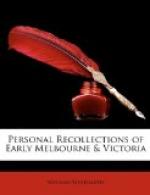In such times a large family of ladies might have trodden the soil somewhat as goddesses come down to the desolate habitations of men. Four such families of the earliest times, in particular, rise to my recollection. They were those of Mr. Grylls and Mr. Clow, both clergymen, the one of the Anglican, the other of the Presbyterian communion; of Mrs. Williamson, a widow lady from near Edinburgh; and of Mr. James Smith, Magistrate and Savings Bank manager, whose bustling form, ever hurrying through our streets, was perhaps the best known of the place, and who, along with his friend and co-magistrate, Mr. Simpson, was as the coping stone of local respectability. That all of these fair young maidens, most of them remarkably attractive and pleasing, as I have reason to remember, were duly married, need hardly, under all the circumstances, be told, besides being attested to-day by whole generations of consequences.
Another feature of those early times, a lively and bright feature in many respects, was the considerable number of young men, the younger sons of good families—and, for that matter, the elder sometimes along with the younger—who flocked out, in unusual proportion, I might say, and who infused into the somewhat rough social scene the charm of high culture and manners. Wild they doubtless were in instances not a few; but even that may not be without its side of charm, at least amongst the younger votaries. Some few eventually returned “Home,” mostly those who had been shipwrecked in the troubled sea of early-time speculation. But most of them have remained to take their various and full part in colonial society, not a few taking the very highest positions. Thus we had the Stawells and Barrys, the Leslie Fosters, Sladens, Rusdens, of town and neighbourhood, and the Campbells, McKnights, Irvines, of surrounding squatterdom. Most of these are long since the fathers of families, native Australians, including sons who not unfrequently finished their education in the mother country—a dutiful deference which Australia may surely not yet quarrel with. This habit is still strong, even to the third generation in Victoria, amongst her well-to-do colonists. The youths may not expect better training than from a Hearn or a McCoy, an Irving or a Pearson, on the colonial floor; but such diversion from rule will, in its occasional way, the better help to keep the great scattering family united to their venerable mother—to keep together the elder and the younger Britain.




